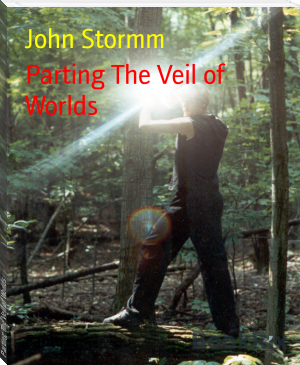The Well at the World's End: A Tale, William Morris [rainbow fish read aloud TXT] 📗

- Author: William Morris
Book online «The Well at the World's End: A Tale, William Morris [rainbow fish read aloud TXT] 📗». Author William Morris
But presently he arose to his feet and went hither and thither, and came upon the quenched coals of the cooking-fire: she had baked cakes for his eating, and he saw them lying thereby, and hunger constrained him, so he took and ate of them while the tears ran down his face and mingled with the bread he ate. And when he had eaten, he felt stronger and therefore was life more grievous to him, and when he thought what he should do, still one thing seemed more irksome than the other.
He went down to the water to drink, and passed by the body of the Knight of the Sun, and wrath was fierce in his heart against him who had overthrown his happiness. But when he had drunk and washed hands and face he came back again, and hardened his heart to do what he must needs do. He took up the body of the Lady and with grief that may not be told of, he drew it into the cave, and cut boughs of trees and laid them over her face and all her body, and then took great stones from the scree at that other end of the little plain, and heaped them upon her till she was utterly hidden by them. Then he came out on to the green place and looked on the body of his foe, and said to himself that all must be decent and in order about the place whereas lay his love. And he came and stood over the body and said: "I have naught to do to hate him now: if he hated me, it was but for a little while, and he knew naught of me. So let his bones be covered up from the wolf and the kite. Yet shall they not lie alongside of her. I will raise a cairn above him here on this fair little plain which he spoilt of all joy." Therewith he fell to, and straightened his body, and laid his huge limbs together and closed his eyes and folded his arms over his breast; and then he piled the stones above him, and went on casting them on the heap a long while after there was need thereof.
Ralph had taken his raiment from the stream-side and done them on before this, and now he did on helm and hauberk, and girt his sword to his side. Then as he was about leaving the sorrowful place, he looked on Silverfax, who had not strayed from the little plain, and came up to him and did off saddle and bridle, and laid them within the cave, and bade the beast go whither he would. He yet lingered about the place, and looked all around him and found naught to help him, and could frame in his mind no intent of a deed then, nor any tale of a deed he should do thereafter. Yet belike in his mind were two thoughts, and though neither softened his grief save a little, he did not shrink from them as he did from all others; and these two were of his home at Upmeads, which was so familiar to him, and of the Well at the World's End, which was but a word.
CHAPTER 11 Ralph Cometh Out of the Wilderness
Long he stood letting these thoughts run through his mind, but at last when it was now midmorning, he stirred and gat him slowly down the green slope, and for very pity of himself the tears brake out from him as he crossed the stream and came into the bushy valley. There he stayed his feet a little, and said to himself: "And whither then am I going?" He thought of the Castle of Abundance and the Champions of the Dry Tree, of Higham, and the noble warriors who sat at the Lord Abbot's board, and of Upmeads and his own folk: but all seemed naught to him, and he thought: "And how can I go back and bear folk asking me curiously of my wayfarings, and whether I will do this, that, or the other thing." Withal he thought of that fair damsel and her sweet mouth in the hostelry at Bourton Abbas, and groaned when he thought of love and its ending, and he said within himself: "and now she is a wanderer about the earth as I am;" and he thought of her quest, and the chaplet of dame Katherine, his gossip, which he yet bore on his neck, and he deemed that he had naught to choose but to go forward and seek that he was doomed to; and now it seemed to him that there was that one thing to do and no other. And though this also seemed to him but weariness and grief, yet whereas he had ever lightly turned him to doing what work lay ready to hand; so now he knew that he must first of all get him out of that wilderness, that he might hear the talk of folk concerning the Well at the World's End, which he doubted not to hear again when he came into the parts inhabited.
So now, with his will or without it, his feet bore him on, and he followed up the stream which the Lady had said ran into the broad river called the Swelling Flood; "for," thought he, "when I come thereabout I shall presently find some castle or good town, and it is like that either I shall have some tidings of the folk thereof, or else they will compel me to do something, and that will irk me less than doing deeds of mine own will."
He went his ways till he came to where the wood and the trees ended, and the hills were lower and longer, well grassed with short grass, a down country fit for the feeding of sheep; and indeed some sheep he saw, and a shepherd or two, but far off. At last, after he had left the stream awhile, because it seemed to him to turn and wind round over much to the northward, he came upon a road running athwart the down country, so that he deemed that it must lead one way down to the Swelling Flood; so he followed it up, and after a while began to fall in with folk; and first two Companions armed and bearing long swords over their shoulders: he stopped as they met, and stared at them in the face, but answered not their greeting; and they had no will to meddle with him, seeing his inches and that he was well armed, and looked no craven: so they went on.
Next he came on two women who had with them an ass between two panniers, laden with country stuff; and they were sitting by the wayside, one old and the other young. He made no stay for them, and though he turned his face their way, took no heed of them more than if they were trees; though the damsel, who was well-liking and somewhat gaily clad, stood up when she saw his face anigh, and drew her gown skirt about her and moved daintily, and sighed and looked after him as he went on, for she longed for him.
Yet again came two men a-horseback, merchants clad goodly, with three carles, their servants, riding behind them; and all these had weapons and gave little more heed to him than he to them. But a little after they were gone, he stopped and said within himself: "Maybe I had better have gone their way, and this road doubtless leadeth to some place of resort."
But even therewith he heard horsehoofs behind him, and anon came up a man a-horseback, armed with jack and sallet, a long spear in his hand, and budgets at his saddle-bow, who looked like some lord's man going a message. He nodded to Ralph, who gave him good-day; for seeing these folk and their ways had by now somewhat amended his mind; and now he turned not, but went on as before.
At last the way clomb a hill longer and higher than any he had yet crossed, and when he had come to the brow and looked down, he saw the big river close below running through the wide valley which he had crossed with Roger on that other day. Then he sat down on the green bank above the way, so heavy of heart that not one of the things he saw gave him any joy, and the world was naught to him. But within a while he came somewhat to himself, and, looking down toward the river, he saw that where the road met it, it was very wide, and shallow withal, for the waves rippled merrily and glittered in the afternoon sun, though there was no wind; moreover the road went up white from the water on the other side, so he saw clearly that this was the ford of a highway. The valley was peopled withal: on the other side of the river was a little thorp, and there were carts and sheds scattered about the hither side, and sheep and neat feeding in the meadows, and in short it was another world from the desert.
CHAPTER 12 Ralph Falleth in With Friends and Rideth to Whitwall
Ralph looks on to the ford and sees folk riding through the thorp aforesaid and down to the river, and they take the water and are many in company, some two score by his deeming, and he sees the sun glittering on their weapons.
Now he thought that he would abide their coming and see if he might join their company, since if he crossed the water he would be on the backward way: and it was but a little while ere the head of them came up over the hill, and were presently going past Ralph, who rose up to look on them, and be seen of them, but they took little heed of him. So he sees that though they all bore weapons, they were not all men-at-arms, nay, not more than a half score, but those proper men enough. Of the others, some half-dozen seemed by their attire to be merchants, and the rest their lads; and withal they had many sumpter horses and mules with them. They greeted him not, nor he them, nor did he heed them much till they were all gone by save three, and then he leapt into the road with a cry, for who should be riding there but Blaise, his eldest brother, and Richard the Red with him, both in good case by seeming; for Blaise was clad in a black coat welted with gold, and rode a good grey palfrey, and Richard was armed well and knightly.
They knew him at once, and drew rein, and Blaise lighted down from his horse and cast his arms about Ralph, and said: "O happy day! when two of the Upmeads kindred meet thus in an alien land! But what maketh thee here, Ralph? I thought of thee as merry and safe in Upmeads?"
Ralph said smiling, for his heart leapt up at the sight of his kindred: "Nay, must I not seek adventures like the rest? So I stole myself away from father and mother." "Ill done, little lord!" said Blaise, stroking Ralph's cheek.
Then up came Richard, and if Blaise were glad, Richard was twice glad, and quoth he: "Said I not, Lord Blaise, that this chick would be the hardest of all to keep under the coop? Welcome to the Highways, Lord Ralph! But where is thine horse? and whence and whither is it now? Hast thou met with some foil and been held to ransom?"
Ralph found it hard and grievous and dull work to answer; for now again his sorrow had taken hold of him: so he said: "Yea, Richard, I have had adventures, and have lost rather than won; but at least I am a free man, and have spent but little gold on my loss."
"That is well," said Richard, "but whence gat ye any gold for spending?" Ralph smiled, but sadly, for he called to mind the glad setting forth and the kind face of dame





Comments (0)